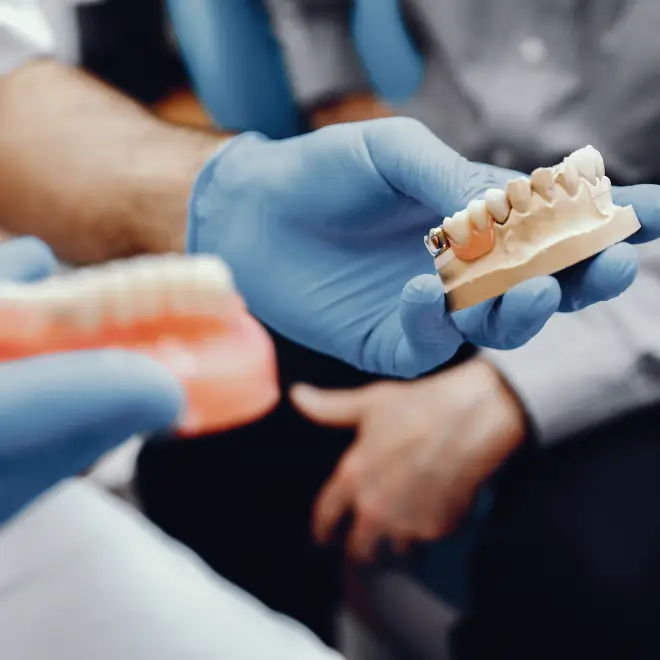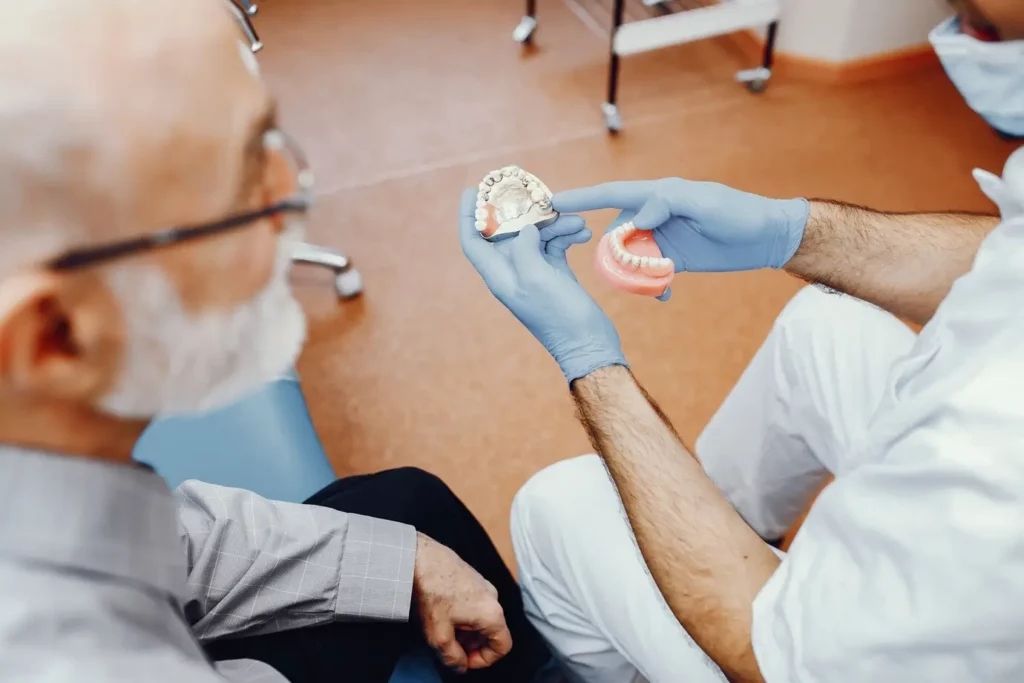
Clifton Dentist - Dental Bridges
Need a consult?

Information
Dental bridges are used to replace one or more missing teeth. They consist of one or more artificial teeth, known as pontics, which are held in place by dental crowns attached to the adjacent natural teeth or implants. This creates a “bridge” over the gap left by missing teeth.
Dental bridges not only restore the appearance of a patient’s smile but also help maintain the natural shape of the face, prevent remaining teeth from shifting out of position, and distribute the forces in your bite more evenly. They can be made from various materials, including porcelain to match the natural color of your teeth.
Doctor
Choosing Dr. Edward Doktorman for your dental bridges, especially if you’re considering a permanent dental bridge, offers quite a few advantages under the expert care of Dr. Edward Doktorman. As a reputable dentist in Clifton, Dr. Doktorman specializes in providing high-quality ceramic bridges, ensuring that your restoration not only feels comfortable but also looks natural, particularly important for a front dental bridge where the look is most often the main goal.
Dr. Edward Doktorman is known for its transparent approach to dental bridges cost, so that patients receive detailed information about their treatment options and costs, with no hidden fees. Our commitment to using the latest dental technologies and only the best materials means that every dental bridge, along with dental crowns when needed, is designed to look good, feel right, and last its longest.
By choosing Dr. Edward Doktorman, patients benefit from Dr. Doktorman’s experience and unique approach, so that each dental bridge meets the individual needs and expectations of the patient, all within the comfortable and welcoming environment of our dental office in Clifton.

Testimonials
Trustindex verifies that the original source of the review is Google. I have been to many dentists throughout the years, mainly because as a kid too young adult, I did not take good care of my teeth, so now im paying the price. This is by far the best dentist i have ever been to, he redid the work of a bad crown from another dentist and also did an implant for me, during the entire process of both procedures during different time frames he made me feel comfortable and took his time with me, answering all my questions. It's refreshing to have a dentist who doesn't rush from door to door, taking in multiple patients at once. After the implant tooth was put in, if I needed more adjustments, he let me know to call, and he will make time to get it adjusted for me. Also, so far, appointments have been very spot on, at most 5 - 10 min wait, but sometimes I get in even earlier. This is my main dentist now for all work going forward.Trustindex verifies that the original source of the review is Google. I’ve been a regular patient of Dr. Doctorman for over a decade, and I can confidently say he’s an exceptional dentist. His expertise and attention to detail have resolved all my dental issues, and his commitment to thorough, personalized care is unmatched. I consistently receive top-notch treatment during my regular checkups, and his friendly demeanor makes each visit pleasant. Dr. Doctorman is the ultimate professional in his field, and I highly recommend him to anyone seeking reliable and effective dental care.Trustindex verifies that the original source of the review is Google. Excellent service, always patient with me to ease my nerves during any process and kind staff. Highly recommend!Trustindex verifies that the original source of the review is Google. I’ve been going to Dr. Doktorman for a few years now, and he’s been great. He’s really good at what he does and always makes sure I understand what’s going on with my teeth. I used to feel a little nervous about going to the dentist, but he’s so calm and friendly that it’s not a big deal anymore. The office is nice and clean, and the staff is always polite and helpful. I highly recommend Dr. Doktorman if you’re looking for a dentist who’s professional and easy to talk to. He’s been a great dentist, and I’m extremely happy with the care that I’ve received.Trustindex verifies that the original source of the review is Google. Dr Doktorman has been my dentist for nearly 10 years. He is always very courteous and professional. I always recommend him to friends and family.Trustindex verifies that the original source of the review is Google. I have been Dr. Dokterman's patient for years and will continue to be. From typical cavity fillings to root canals his work is top notch. He and his staff are also welcoming and professional.Trustindex verifies that the original source of the review is Google. Dr. Doktorman has great customer service and he and his dental staff do wonderful dental work!Trustindex verifies that the original source of the review is Google. Excellent clinic. I am a patient of Doctorman for the last five years, his very profesional and a good doctor. Staf its very helpful and friendly I would recommend Prestige dental to all my friends and family.Trustindex verifies that the original source of the review is Google. I was referred by a good friend. I Never have to wait later than my appointment time. The office is very clean and the staff is amazing. Dr. Doktorman is very informative and knowledgeable, he explains everything in details. I can’t wait to go to my next cleaning.Trustindex verifies that the original source of the review is Google. I can't say enough great things about Dr. Doktorman! He is incredibly caring and truly goes above and beyond for his patients. I always appreciate how he follows up after appointments to ensure everything is going well—it's clear he genuinely cares about his work and his patients' well-being. He is honest, trustworthy, and takes the time to listen to my concerns, making me feel heard and valued as a patient. I trust him wholeheartedly, not just with my care but with my entire family's as well.

Information
Dental bridges offer a wide range of benefits. Firstly, bridges dental help to restore the functionality of your mouth, enabling you to chew and speak properly once again. They also play a role in maintaining the shape of your face, preventing the sagging that can occur following tooth loss.
Another advantage is the prevention of remaining teeth from drifting out of position, which can lead to a misaligned bite and other dental issues. Dental bridges also distribute the forces in your bite more effectively, providing relief to natural teeth from excess pressure.
For those looking for a more permanent solution, dental implant bridges offer the added benefit of supporting jaw health by stimulating bone growth, preventing bone loss that often accompanies tooth loss. All in all, dental bridges are a durable, functional, and aesthetically pleasing solution for replacing missing teeth.
INFORMATION
The most common type, it involves creating a dental crown or implant on either side of the missing tooth, with a pontic placed in between. It is ideal for those who have natural teeth on either side of the gap.
Similar to the traditional bridge dental, but the pontic is supported by a crown on only one side. Suitable when there are teeth on just one side of the lost tooth or teeth.
Also known as a resin-bonded bridge, it uses metal or porcelain wings on one side of the bridge that bond to your existing teeth. Less invasive than traditional bridges.
Uses dental implants rather than crowns or frameworks. Each pontic is supported by its own implant. Best for when more than one tooth is missing, providing a strong and stable solution.

Information
Before

After

Information
These steps, carried out at Prestige Dental by Dr. Doktorman, ensure a secure and comfortable fit for your dental bridge in Clifton, NJ.
Determining if you need dental bridges involves evaluating your oral health and dental needs. Here’s a list of considerations to help you decide if dental bridges might be the right solution for you:
Caring for your dental bridges properly is key to ensuring their longevity and maintaining your overall oral health. Follow these essential tips to keep your bridges in top condition:
By following these care tips, you can protect your dental bridges and enjoy a healthy, confident smile for years to come.
Indications
Contraindications
Before getting dental bridges, it’s important to discuss your medical history with your dentist, as certain health conditions or medications may impact the success of the procedure. Inform your dentist of any allergies or sensitivities, especially regarding the materials used for the bridge.
Carefully follow all post-procedure care instructions to avoid complications and ensure the long-term success of your dental bridges. If you experience any unusual pain, swelling, or discomfort after the procedure, contact your dentist immediately. Regular check-ups are crucial to monitor the condition of your dental bridges and maintain your overall oral health.
At Dr. Doktorman’s office, we are in-network with many major insurance providers to make your dental bridge treatment more affordable and accessible. We work with leading insurance companies, including:
We also collaborate with many other insurance plans. If you have any questions about your coverage or need assistance understanding your benefits for dental bridges, our team is ready to help guide you through the process.
At Dr. Doktorman’s office in Clifton, NJ, we understand that the cost of dental bridges is an important consideration for many patients. The overall cost can vary depending on factors such as the number of missing teeth, the materials used, and the complexity of your specific case.
We strive to make dental bridges affordable by offering flexible payment options and working with a wide range of insurance providers. Our team will provide a detailed cost estimate during your consultation, ensuring you fully understand the treatment plan and associated costs.
If you have questions about your insurance coverage or payment options for dental bridges, our staff is here to help guide you through the process and make your dental care as accessible as possible.
Dr. Edward Doktorman, DDS, has been consistently recognized by the Consumers’ Research Council of America for his excellence in family, cosmetic, implantology, and general dentistry, earning multiple “America’s Top Dentists” awards from 2014 to 2017.
List of Certificates:
A dental bridge is a fixed prosthetic device used to replace one or more missing teeth. It consists of two or more crowns (called abutments) on either side of the gap, with one or more artificial teeth (called pontics) in between. The crowns are placed over the natural teeth or dental implants adjacent to the gap, anchoring the bridge in place and restoring both function and aesthetics to the smile.
Dental bridges can be made from various materials, including porcelain, ceramic, metal alloys, or a combination of these materials. Porcelain and ceramic bridges are often preferred for their natural appearance, as they closely resemble the color and translucency of natural teeth. Metal alloys may be used for the underlying framework of the bridge to provide strength and support.
The lifespan of a dental bridge can vary depending on factors such as oral hygiene practices, bite force, and the materials used. On average, a well-maintained dental bridge can last for 10 to 15 years or more. Regular dental check-ups and proper oral care, including brushing, flossing, and routine professional cleanings, can help prolong the lifespan of a dental bridge.
The cost of a dental bridge depends on several factors, including the number of teeth to be replaced, the materials used, and any additional procedures required (such as preparatory work on adjacent teeth or dental implant placement). Prices can vary widely depending on these factors and your location. It’s best to consult with your dentist for a personalized cost estimate based on your specific needs and circumstances.
Need a consult?